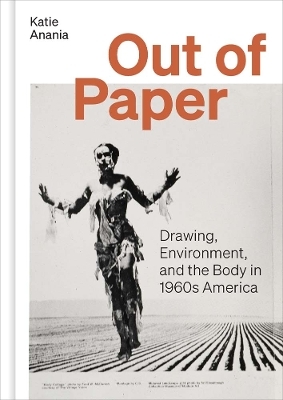
Out of Paper
Drawing, Environment, and the Body in 1960s America
Seiten
2024
Yale University Press (Verlag)
978-0-300-27223-9 (ISBN)
Yale University Press (Verlag)
978-0-300-27223-9 (ISBN)
A dynamic look at how artists used paper to radically redefine the relationship between the body and its surroundings, and to propose new conceptions of ecology
From sketches created inside pants pockets to paper-strewn performances that took cues from protests and riots, the work on paper in the 1960s acted as a mobile, flexible connective tissue between the body and the world around it. In this book, Katie Anania reveals how artists Carolee Schneemann, William Anastasi, Richard Tuttle, Robert Morris, and Charles White harnessed this historically intimate medium during a period in which Americans were becoming urgently concerned with identity, consumer culture, the overreach of state power, and the rapidly deteriorating natural world. Her reexamination of drawing shows how the omnipresence of paper facilitated artists’ critiques of dominant systems, from modern throwaway culture to bureaucracy to colonial violence.
Engaging a wide range of actions—such as recycling, recording, cutting, planning, and erasing—Anania offers fresh insights into paper’s role not merely as a preparatory medium but one essential to the histories of performance, minimalist, conceptual, and land art. Out of Paper uses materiality studies, social history, and feminist art historical methods to situate paper as a major conduit for thought in the postwar United States.
From sketches created inside pants pockets to paper-strewn performances that took cues from protests and riots, the work on paper in the 1960s acted as a mobile, flexible connective tissue between the body and the world around it. In this book, Katie Anania reveals how artists Carolee Schneemann, William Anastasi, Richard Tuttle, Robert Morris, and Charles White harnessed this historically intimate medium during a period in which Americans were becoming urgently concerned with identity, consumer culture, the overreach of state power, and the rapidly deteriorating natural world. Her reexamination of drawing shows how the omnipresence of paper facilitated artists’ critiques of dominant systems, from modern throwaway culture to bureaucracy to colonial violence.
Engaging a wide range of actions—such as recycling, recording, cutting, planning, and erasing—Anania offers fresh insights into paper’s role not merely as a preparatory medium but one essential to the histories of performance, minimalist, conceptual, and land art. Out of Paper uses materiality studies, social history, and feminist art historical methods to situate paper as a major conduit for thought in the postwar United States.
Katie Anania is assistant professor of art history at the University of Nebraska, Lincoln.
| Erscheinungsdatum | 26.09.2024 |
|---|---|
| Zusatzinfo | 57 color + 54 b-w illus. |
| Sprache | englisch |
| Maße | 178 x 254 mm |
| Themenwelt | Kunst / Musik / Theater ► Kunstgeschichte / Kunststile |
| Kunst / Musik / Theater ► Malerei / Plastik | |
| Sachbuch/Ratgeber ► Freizeit / Hobby ► Malen / Zeichnen | |
| Geschichte ► Teilgebiete der Geschichte ► Kulturgeschichte | |
| Sozialwissenschaften ► Politik / Verwaltung ► Politische Theorie | |
| Sozialwissenschaften ► Soziologie | |
| ISBN-10 | 0-300-27223-5 / 0300272235 |
| ISBN-13 | 978-0-300-27223-9 / 9780300272239 |
| Zustand | Neuware |
| Informationen gemäß Produktsicherheitsverordnung (GPSR) | |
| Haben Sie eine Frage zum Produkt? |
Mehr entdecken
aus dem Bereich
aus dem Bereich
der stille Abschied vom bäuerlichen Leben in Deutschland
Buch | Hardcover (2023)
C.H.Beck (Verlag)
23,00 €
vom Mittelalter bis zur Gegenwart
Buch | Softcover (2024)
C.H.Beck (Verlag)
12,00 €


